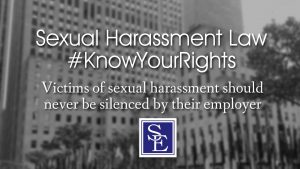Sexual harassment and assault against female members of the military remains a persistent problem that has rightfully received heightened attention in the last few years in the hope that it can be eradicated from all branches of our armed forces. Gender-based harassment and assault are prevalent in the world of veterans affairs as well, and the area of veterans’ health care in particular has come under scrutiny.
 According to a national Health Services Research and Development survey conducted by the U.S. Department of Veterans Affairs (VA), 25% of women patients at VA health care facilities have experienced sexual or other harassment from other veterans. The VA defines patient harassment as “unwelcome physical, non-verbal or verbal behavior that interferes with a veteran’s access to and sustained engagement with VA health care. Harassment creates an intimidating, hostile or offensive health care environment.” The VA also provides examples of harassing conduct. For instance, the VA recognizes the failure to acknowledge women as veterans as gender harassment, and it occurs when someone asks a woman veteran if she is accompanying her husband to an appointment or questions her about the authenticity of clothing identifying a branch or era of service. On Vantage Point, the official blog of the VA, it also lists catcalls, whistles, stares, leering or ogling, telling women to smile, telling women they are too pretty to be veterans and following or cornering someone as examples of gender-based harassment. By all appearances, the VA is working to identify, educate veterans about, and eradicate this type of sexual harassment.
According to a national Health Services Research and Development survey conducted by the U.S. Department of Veterans Affairs (VA), 25% of women patients at VA health care facilities have experienced sexual or other harassment from other veterans. The VA defines patient harassment as “unwelcome physical, non-verbal or verbal behavior that interferes with a veteran’s access to and sustained engagement with VA health care. Harassment creates an intimidating, hostile or offensive health care environment.” The VA also provides examples of harassing conduct. For instance, the VA recognizes the failure to acknowledge women as veterans as gender harassment, and it occurs when someone asks a woman veteran if she is accompanying her husband to an appointment or questions her about the authenticity of clothing identifying a branch or era of service. On Vantage Point, the official blog of the VA, it also lists catcalls, whistles, stares, leering or ogling, telling women to smile, telling women they are too pretty to be veterans and following or cornering someone as examples of gender-based harassment. By all appearances, the VA is working to identify, educate veterans about, and eradicate this type of sexual harassment.
However, some question the VA’s dedication to gender equality and safety in its health care facilities after Andrea Goldstein, senior policy advisor on female veterans to the House Committee on Veterans Affairs and lieutenant commander in the U.S. Navy Reserve, alleged she had been sexually assaulted at a government-run veterans’ hospital. Goldstein, who has chosen to make her identity known, claimed in September 2019 that while she was waiting in line to buy food in the main lobby of the VA hospital in Washington, D.C., a contractor rubbed his body against hers and made suggestive comments of a sexual nature. Since that time, the VA and specifically its Secretary of Veterans Affairs for the Trump administration Robert Wilkie’s handling of her claim have come under scrutiny. The ensuing investigations have raised serious questions about how the VA handles complaints of sexual harassment, assault and retaliation and point to larger societal problems of victim-blaming and refusing to address systemic problems of gender equality and respect for female veterans.
 New Jersey Employment Lawyers Blog
New Jersey Employment Lawyers Blog


